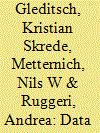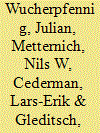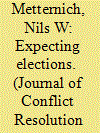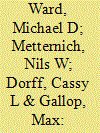|
|
|
Sort Order |
|
|
|
Items / Page
|
|
|
|
|
|
|
| Srl | Item |
| 1 |
ID:
128874


|
|
|
|
|
| Publication |
2014.
|
| Summary/Abstract |
We highlight how efforts to collect systematic data on conflict have helped foster progress in peace and conflict research. The Journal of Peace Research has played a key role in these developments, and has become a leading outlet for the new wave of disaggregated conflict data. We survey progress in the development of conflict data and how this interacts with theory development and progress in research, drawing specifically on examples from the move towards a greater focus on disaggregation and agency in conflict research. We focus on disaggregation in three specific dimensions, namely the resolution of conflict data, agency in conflict data, and the specific strategies used in conflict, and we also discuss new efforts to study conflict processes beyond the use of violence. We look ahead to new challenges in conflict research and how data developments and the emergence of 'big data' push us to think harder about types of conflict, agency, and the 'right' level of aggregation for querying data and evaluating specific theories.
|
|
|
|
|
|
|
|
|
|
|
|
|
|
|
|
| 2 |
ID:
112511


|
|
|
|
|
| Publication |
2012.
|
| Summary/Abstract |
Previous research has focused primarily on how ethnicity may trigger civil war, and its effect on conflict duration remains disputed. Rather than treating conflict as a direct consequence of ethnic cleavages, the authors argue that ethnicity per se does not affect civil war duration. Instead, its effect depends on its relationship to political institutions. They employ a dyadic approach that emphasizes the political context in which both government leaders and nonstate challengers can capitalize on the ascriptive nature of ethnicity. They show that although states can initially benefit from politicizing ethnic relations, once violent conflict breaks out, such policies may backfire on the government and make it difficult for incumbent governments to accept settlements that could terminate conflicts. Past policies of ethnic exclusion also benefit rebel organizations fighting the government, since the resulting grievances increase collective group solidarity and render individual fighters more cost tolerant. Using a new data set that codes the nexus between rebel organizations and ethnic groups, as well as information on ethnopolitical exclusion, the authors find considerable support for their propositions.
|
|
|
|
|
|
|
|
|
|
|
|
|
|
|
|
| 3 |
ID:
109933


|
|
|
|
|
| Publication |
2011.
|
| Summary/Abstract |
International organizations (IOs) frequently link their military interventions with democratization efforts in the target state. However, existing research suggests that these attempts often fail. This article analyzes the conditions under which interventions by IOs shorten or prolong civil war dyads. When militarily strong rebel groups with low public support expect externally enforced democratization, they have incentives to continue fighting. These incentives arise when democratization leads to power shifts that cause commitment problems for belligerents with high popular support. Cox hazards models are used to test the article's hypotheses on a new data set on African rebel leaders' ethnicity. The results demonstrate that IO interventions with democratization mandates are only associated with shorter conflicts if rebel leaders come from ethnic groups representing more than 10 percent of a country's population. IO interventions without democratization mandates are not associated with shorter conflict duration and show no interaction effect with the rebels' ethnic support.
|
|
|
|
|
|
|
|
|
|
|
|
|
|
|
|
| 4 |
ID:
153656


|
|
|
|
|
| Summary/Abstract |
While some borders are real firewalls against conflicts, others appear like tinder just waiting for the smallest spark. Only recently has research focused on the transnational perspective of conflict and current research has focused mostly on isolated aspects of this phenomenon. In this article, we provide a unified framework for conflict contagion that takes into account receiver, sender, dyad, and network effects. This is a novel perspective on conflict contagion, and our empirical results suggest that distinguishing between sender and receiver effects allows for a better understanding of spillover effects. We provide insights that especially excluded ethnic groups impact the risk of countries sending and receiving conflicts from its neighbors.
|
|
|
|
|
|
|
|
|
|
|
|
|
|
|
|
| 5 |
ID:
126714


|
|
|
|
|
| Publication |
2013.
|
| Summary/Abstract |
Developing political forecasting models not only increases the ability of political scientists to inform public policy decisions, but is also relevant for scientific advancement. This article argues for and demonstrates the utility of creating forecasting models for predicting political conflicts in a diverse range of country settings. Apart from the benefit of making actual predictions, we argue that predictive heuristics are one gold standard of model development in the field of conflict studies. As such, they shed light on an array of important components of the political science literature on conflict dynamics. We develop and present conflict predictions that have been highly accurate for past and subsequent events, exhibiting few false-negative and false-positive categorizations. Our predictions are made at the monthly level for 6-month periods into the future, taking into account the social-spatial context of each individual country. The model has a high degree of accuracy in reproducing historical data measured monthly over the past 10 years and has approximately equal accuracy in making forecasts. Thus, forecasting in political science is increasingly accurate. At the same time, by providing a gold standard that separates model construction from model evaluation, we can defeat observational research designs and use true prediction as a way to evaluate theories. We suggest that progress in the modeling of conflict research depends on the use of prediction as a gold standard of heuristic evaluation.
|
|
|
|
|
|
|
|
|
|
|
|
|
|
|
|
|
|
|
|
|